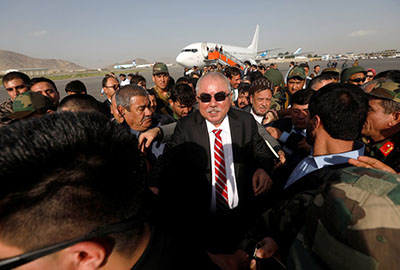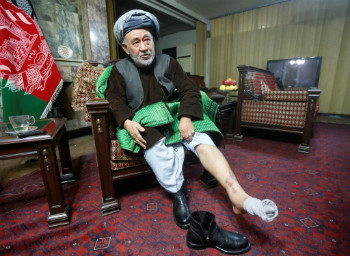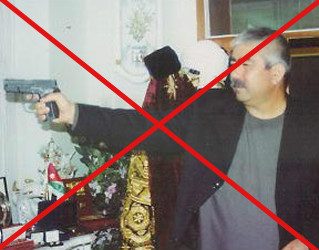By Mujib Mashal
KABUL, Afghanistan — On the television screen in a second-floor room in Kabul last month, Ahmad Ishchi watched it live: how justice in Afghanistan bends to the powerful.
Instead of being taken away in handcuffs, those accused of heinous crimes in this country can be seen strolling a red carpet.
In the winter of 2016, Mr. Ishchi went on national television to accuse Gen. Abdul Rashid Dostum, the vice president of a government bankrolled by the United States, of abducting him, and then punching and kicking him until a pool of blood formed under his feet. General Dostum, he said, next dropped his pants and tried — and failed — to rape him before asking his guards to sexually assault him with their guns.

Gen. Abdul Rashid Dostum, the vice president of Afghanistan, arriving in Kabul last month, ending his self-imposed exile in Turkey. Mr. Ghani’s cabinet officials, including a second vice president, Mohammad Mohaqiq, were part of the crowd that welcomed him. (Photo: Omar Sobhani/Reuters)
During those televised interviews in which he described what had been done to him, Mr. Ishchi, 63, who was perceived as a rival to General Dostum’s leadership of Afghanistan’s Uzbek community, couldn’t sit straight because his wounds, verified by two medical forensic reports, were still too fresh.
While General Dostum had a long history of alleged human rights abuses that had never been prosecuted, it was harder for the government to ignore charges aired before such a large TV audience. President Ashraf Ghani promised justice, telling Western diplomats he would not tolerate this on his watch.
Amid an investigation into the rape allegations, General Dostum went into exile in Turkey. For more than a year after he left, he and two of his chief bodyguards refused to cooperate with investigators, vehemently denying the charges and calling it all a conspiracy.
Seven of General Dostum’s guards were sentenced to five years in prison. Court documents, which presented interviews with dozens of eyewitnesses as part of the evidence, left no doubt that the crime had happened.
Then, last month, General Dostum returned from exile — not, however, to submit to a court appearance, but to revel in a red-carpet reception.
Mr. Ishchi watched live on television from his Kabul home as Mr. Ghani’s cabinet officials, including a second vice president leading the justice portfolio, thronged the steps of the general’s plane. He watched as General Dostum, after a near miss with a suicide bombing, drove to his palace, where he told his supporters to celebrate.
“Play your drums, your dambura tonight,” said General Dostum, a charismatic orator, referring to a type of lute. “Tomorrow, go back to your studies.”
Lined up behind the general were several of the bodyguards who had been convicted — and who should have been in jail, not on television.
“Their weapons in hand, in uniform, they were standing behind him,” Mr. Ishchi said. “It’s been seven months since the court sentenced them, and no one has taken action. This is clearly political treatment of the case, and admission of weakness.”
What Mr. Ishchi said he saw was a government that had promised justice but showed no will for it. Or couldn’t deliver it.
And he saw a class of former warlords, many of them also accused of crimes, uniting around General Dostum despite recent bloody battles with him, because if one of them faced justice it would leave the rest vulnerable, too.

Ahmad Ishchi, who says he was detained and assaulted on Dostum’s orders last month, displays an injury on his leg at his home in Kabul on Dec. 13. (Omar Sobhani/Reuters)
Mr. Ishchi said he took the celebrations around the general’s homecoming as another display of how “there is no shame, there is no conscience” among Afghanistan’s leadership.
His son, Baktash, said his father was worried. With General Dostum back, what would happen to the dozens who had provided eyewitness accounts of the crime, and to the hundreds who had protested against it? Already, some armed men have fired in the air in front of Mr. Ishchi’s house in his home province, Jowzjan, where he was once governor.
“He was very demoralized,” Baktash said.
He tried to console his father, telling him the general’s return increased the odds of a court hearing, although he didn’t really believe that. To try to lift his father’s spirits, he said, “we told him all the lies we could.”
Despite coming to power with the help of people like General Dostum, whom he had called a “known killer” in the years before choosing him as a running mate, Mr. Ghani, the author of a book called “Fixing Failed States,” had raised the hopes of many Afghans that he would rein in the crimes and corruption of the elite.
Last week, however, the top American watchdog for Afghanistan issued a scathing review of Mr. Ghani’s efforts. The American government views Afghanistan as “consistent with a largely lawless, weak, and dysfunctional government,” the Special Inspector General for Afghanistan Reconstruction said in a report.
Court documents and interviews with officials suggest that a genuine effort was made by lower level officials to bring General Dostum to justice, but that it was scuttled by lack of political will at the top.
Prosecutors repeatedly punched above their weight, including convincing the country’s Supreme Court to move the case from Jowzjan, the scene of the crime — where General Dostum exerts almost total control — to more neutral ground in Kabul.
The fact that prosecutors even indicted General Dostum surprised many, who had considered him untouchable.
But the judges assigned to the case, based on direction from the Supreme Court, repeatedly asked the prosecutors to drop the vice president’s name from the indictment until he appeared for questioning. He never did so, and the trial was postponed indefinitely. That judicial stance, Mr. Ishchi’s team believes, was where political meddling in the case was decisive.
Even if Mr. Ghani was sincere about wanting justice in this case, he undermined his efforts by political mistakes — which survivors of Afghanistan’s history of turmoil, like General Dostum, are masters at exploiting.

RAWA.org: Dostum's militiamen committed horrendous crimes during the Kabul infighting (1992-1996). His men were involved in killing, raping, looting houses and other crimes.
With the general in exile, Mr. Ghani sent government forces to arrest Nizamuddin Qaisari, the commander of the general’s militia in restive Faryab province, who was also accused of abuses. But the method of arrest stirred trouble for Mr. Ghani, as leaked photos and videos showed the troops kicking and abusing Mr. Qaisari’s bound guards.
General Dostum’s lieutenants took advantage of the anger over the videos, and stoked demonstrations across several provinces in the north. The protests, which demanded the return of General Dostum, continued until Mr. Ghani sent his advisers to Turkey to fly him back to Kabul. Days later, a smiling Mr. Ghani received his vice president in his office.
“The first vice president is back. He goes to his office and continues his job,” said Haroon Chakhansuri, a spokesman for Mr. Ghani. “Legal issues go to the justice system, and they will make their decisions.”
Besides the protests, electoral calculations are another reason for Mr. Ghani warming up to General Dostum. The president faces re-election next year, and losing General Dostum’s Uzbek support base would be a major blow.
Abdul Shukoor Dadras, a legal expert and defense lawyer, said the legal process had lacked clarity on central issues, including whether the country’s sitting vice president could be questioned by the attorney general, or whether a special process was needed.
“Unfortunately, from day one, this case has been dealt with more as a political game,” Mr. Dadras said. “And we saw the result of it, which was the return of General Dostum, as part of a deal, to the seat of vice presidency.”
Mr. Ishchi and his family say they are losing hope that Mr. Ghani’s government will be able to provide justice, particularly in an election year. But they will continue their struggle.
Mr. Ishchi has lodged a case against General Dostum at the International Criminal Court. In Afghanistan, in addition to pressing the government with petition after petition, he has started a newspaper, compiled a book on the case and is working on his memoirs.
“At least we will show the true face of this criminal,” Mr. Ishchi said.
Fahim Abed and Fatima Faizi contributed reporting.



